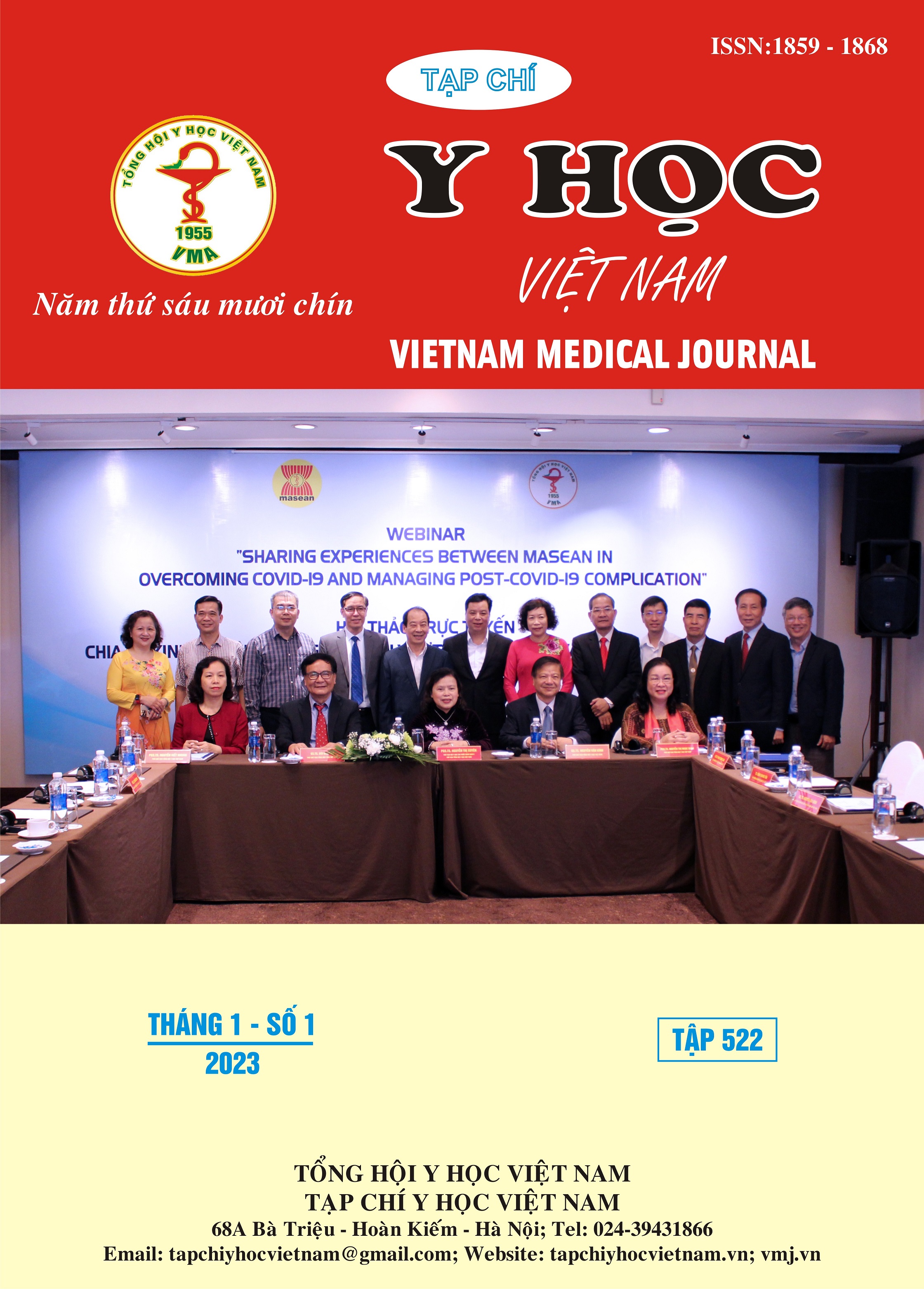STUDY OF CLINICAL AND SUBCLINICAL FEATURES OF PATIENTS DIAGNOSED OF ADVANCED/METASTATIC NON-SMALL CELL LUNG CANCER ACQUIRED RESISTED TO EGFR TKIS FIRST- AND SECOND-GENERATIONS
Main Article Content
Abstract
Objective: Describing the clinical and subclinical features of patients diagnosed of advanced/ metastatic non-small cell lung cancer acquired resistance to EGFR TKIs first- and second-generations at National Cancer Hospital from 01/2017 to 05/2022. Patients and method: Retrospective and prospective analysis of 85 patients with advanced/ metastatic non-small cell lung carcinoma acquired resistance to EGFR TKIs first- and second-generations were diagnosed and treated at National Cancer Hospital from 01/2017 to 05/2022. Results: The average age was 58.2±8.2, rate of male patients was 50.9%. Rate of smoking accounted for 40% and rate of medical history of chronic obstructive pulmonary disease accounted for 23.6%. The common symptoms of advanced lung cancer patients were dry cough, chest pain and dyspnea, accounting for 80%; 74.5% and 60%, respectively. For performance status, ECOG 1 accounted for 44.5%. The common metastatic locations in our patients were bone, lung and pleural/pericardial metastases, accounting for 67.3%; 63.6% and 58.2%, respectively. There were 64.7% of cases had progressed in primary lung tumor and mediastinal nodes. Most of patients underwent lung tumor biopsies (48.2%), cellblock of pleural fluid (17.6%) at the time of progressive disease. Conclusion: Advanced/metastatic EGFR-positive non-small cell lung cancer often occured in middle-older aged patients without history of smoking. The common clinical symptoms were dry cough, chest pain and dyspnea with presence of bone and lung metastases.
Article Details
Keywords
Non-small cell lung cancer, advanced/ metastatic stage, resistance to EGFR TKIs
References
2. Davis, F.; Dolecek, T.; Mccarthy, B.; Villano, J. Toward Determining the Lifetime Occurrence of Metastatic Brain Tumors Estimated from 2007 United States Cancer Incidence Data. Neuro-Oncol. 2012, 14, 1171–1177, doi: 10.1093/ neuonc/nos152.
3. Rosell, R.; Carcereny, E.; Gervais, R.; Vergnenegre, A.; Massuti, B.; Felip, E.; Palmero, R.; Garcia-Gomez, R.; Pallares, C.; Sanchez, J.M.; et al. Erlotinib versus Standard Chemotherapy as First-Line Treatment for European Patients with Advanced EGFR Mutation-Positive Non-Small-Cell Lung Cancer (EURTAC): A Multicentre, Open-Label, Randomised Phase 3 Trial. Lancet Oncol. 2012, 13, 239–246, doi:10.1016/S1470-2045(11)70393-X.
4. Mok, T.S.; Wu, Y.-L.; Thongprasert, S.; Yang, C.-H.; Chu, D.-T.; Saijo, N.; Sunpaweravong, P.; Han, B.; Margono, B.; Ichinose, Y.; et al. Gefitinib or Carboplatin–Paclitaxel in Pulmonary Adenocarcinoma. N. Engl. J. Med. 2009, 361, 947–957, doi:10.1056/ NEJMoa0810699.
5. Sequist, L.V.; Yang, J.C.-H.; Yamamoto, N.; O’Byrne, K.; Hirsh, V.; Mok, T.; Geater, S.L.; Orlov, S.; Tsai, C.-M.; Boyer, M.; et al. Phase III Study of Afatinib or Cisplatin Plus Pemetrexed in Patients With Metastatic Lung Adenocarcinoma With EGFR Mutations. J. Clin. Oncol. 2013, 31, 3327–3334, doi:10.1200/JCO.2012.44.2806.
6. Nguyễn Thanh Hoa, Đ.H.K. Đánh Giá Kết Quả Điều Trị Bước Một Của Thuốc Erlotinib Trên Bệnh Nhân Ung Thư Phổi Tại Bệnh Viện K. Học Thực Hành 2019, 1106(8), 10–12.
7. Xu, Q.; Liu, H.; Meng, S.; Jiang, T.; Li, X.; Liang, S.; Ren, S.; Zhou, C. First-Line Continual EGFR-TKI plus Local Ablative Therapy Demonstrated Survival Benefit in EGFR-Mutant NSCLC Patients with Oligoprogressive Disease. J. Cancer 2019, 10, 522–529, doi:10.7150/ jca.26494.
8. Kim, H.-R.; Lee, J.C.; Kim, Y.-C.; Kim, K.-S.; Oh, I.-J.; Lee, S.Y.; Jang, T.W.; Lee, M.K.; Shin, K.-C.; Lee, G.H.; et al. Clinical Characteristics of Non-Small Cell Lung Cancer Patients Who Experienced Acquired Resistance during Gefitinib Treatment. Lung Cancer 2014, 83, 252–258, doi:10.1016/j.lungcan.2013.11.008.
9. Barrón, F.; Cardona, A.F.; Corrales, L.; Ramirez-Tirado, L.-A.; Caballe-Perez, E.; Sanchez, G.; Flores-Estrada, D.; Zatarain-Barrón, Z.L.; Arrieta, O.; for the Study of Lung Cancer (CLICaP), on behalf of L.A.C. Characteristics of Progression to Tyrosine Kinase Inhibitors Predict Overall Survival in Patients with Advanced Non-Small Cell Lung Cancer Harboring an EGFR Mutation. 2018 2018, 10, 2166–2178.
10. Westover, D.; Zugazagoitia, J.; Cho, B.C.; Lovly, C.M.; Paz-Ares, L. Mechanisms of Acquired Resistance to First- and Second-Generation EGFR Tyrosine Kinase Inhibitors. Ann. Oncol. 2018, 29, i10–i19, doi:10.1093/ annonc/mdx703.


